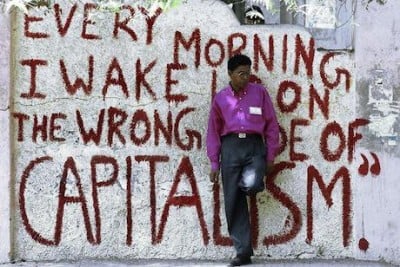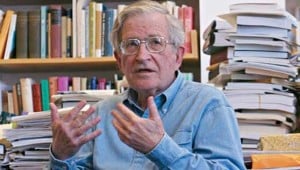Global Capitalism and Its Social, Economic and Political Consequences
Critical Analysis by Noam Chomsky and Michel Chossudovsky

All Global Research articles can be read in 51 languages by activating the Translate Website button below the author’s name (only available in desktop version).
To receive Global Research’s Daily Newsletter (selected articles), click here.
Click the share button above to email/forward this article to your friends and colleagues. Follow us on Instagram and Twitter and subscribe to our Telegram Channel. Feel free to repost and share widely Global Research articles.
Global Research Referral Drive: Our Readers Are Our Lifeline
***
In the present discourse on global capitalism and its social, political, and economic consequences, two influential public intellectual figures from the academe emerge prominently: Noam Chomsky and Michel Chossudovsky.
Both academics proffer penetrating assessments of the exploitative and oppressive nature of capitalism and global corporatocracy and their impacts in our contemporary society. However, the methodological approaches and frameworks of both public intellectuals display notable similarities and remarkable differences that warrant careful examination to understand the nuances of their equally weighty perspectives.
This article aims to analyze, compare, and critically evaluate the similarities and differences of the approaches of Noam Chomsky and Michel Chossudovsky in criticizing the societal exploitation and oppression brought about by global capitalism and corporatocracy on the downtrodden masses and marginalized sectors of society.
Similarities Between Chomsky and Chossudovsky’s Critique of Global Capitalism
1.) Anti-Imperialist and Anti-Neocolonialist Positionalities
Both Noam Chomsky and Michel Chossudovsky espouse an anti-imperialist stance in their critiques of global capitalism and corporatocracy. They highlight the role of powerful Western nations, particularly the United States, in perpetuating economic exploitation, military interventions, regime changes, and geopolitical dominance to further their capitalistic agendas (Cf. Chomsky, Manufacturing Consent: The Political Economy of the Mass Media, p. 30-32).
Their analyses underscore the interconnectedness of capitalism and imperialism, emphasizing how economic exploitation is often intertwined with political and military agendas (Cf. Chossudovsky, The Globalization of Poverty and the New World Order, p. 25).
2.) Critical Emphasis on the Analysis of Corporate Power
Both Noam Chomsky and Michel Chossudovsky focus upon the domination and ascendancy of corporate power in shaping global capitalism. They critique the influence of multinational corporations, financial institutions, and elite economic cartels in controlling resources, manipulating markets, and exacerbating political inequality as well as social and economic inequity (Chomsky, Manufacturing Consent: The Political Economy of the Mass Media, p. 32-34). Both academics highlight how corporate interests and agendas drive policies that prioritize profit over the well-being of people and the ecosystem of our planet, leading to social injustice, environmental degradation, economic instability, and socio-political marginalization (Chossudovsky, The Globalization of Poverty and the New World Order, p. 68).
3.) Scathing Criticisms of Neoliberal Policies
Another common ground in their analyses is the critique of neoliberal policies and neoliberal globalization. Chomsky and Chossudovsky condemn the deregulation, privatization, and austerity measures promoted by neoliberal ideology, arguing that these policies exacerbate poverty, inequality, and social exclusion (Chomsky, Profit Over People: Neoliberalism and Global Order, p. 78). Chomsky and Chossudovsky highlight how neoliberal globalization benefits the wealthy elite at the expense of the working class, leading to wage stagnation, job insecurity, inflation, and the erosion of social welfare systems (Chossudovsky, The Globalization of Poverty and the New World Order, p. 102).
Differences Between Chomsky and Chossudovsky
1.) Methodological Approaches and Frameworks of Analysis
Noam Chomsky’s approach to critiquing global capitalism is rooted in linguistics, philosophy, and political activism. He employs a multidisciplinary standpoint, drawing on historical analysis, empirical research, and ethical deliberation to expose the injustices of capitalism and advocate for social transformation (Chomsky, Profit Over People: Neoliberalism and Global Order, p. 14). Chomsky’s critique is often characterized by a focus on linguistics as well as linguistic philosophy, and emphasis on discourse, highlighting how media, propaganda, and ideological hegemony perpetuate capitalist narratives and maintain oppressive, extractive, and exploitative power structures in contemporary society.
In contrast, Michel Chossudovsky’s approach is more explicitly economic and overtly geopolitical rooted in his expertise in the analytical field of the political science subdisciplines of international politics and global relations. Additionally, as an economist, geopolitical analyst, and an expert in global relations, Chossudovsky emphasizes the role of financial markets, monetary policy, and geopolitics in shaping global capitalism (Chossudovsky, The Globalization of Poverty and the New World Order, p. 47). Chossudovsky’s analyses often incorporate data-driven research and empirical geopolitical analysis to uncover the mechanisms of capitalist exploitation and the interests of global power players: both State and non-State actors as well as public and private corporations and economic institutions that perpetuate political marginalization and economic exploitation in our present times.
2.) Scope and Extent of Analysis
While both Noam Chomsky and Michel Chossudovsky critique global capitalism, they often focus on different aspects and dimensions in their critical analysis of the capitalistic and corporatocratic system. Chomsky’s critiques tend to encompass a broader range of issues, including militarism, imperialism, environmental degradation, and human rights abuses (Chomsky, Profit Over People: Neoliberalism and Global Order, p. 94). He examines the intersectionality of global capitalism with other systems of oppression, such as racism, patriarchy, and colonialism, highlighting the interconnectedness of various forms of injustice and marginalization.
On the other hand, Chossudovsky’s analyses often delve deeply into specific economic and geopolitical phenomena as well as socio-economic interfaces governing economic policies, such as financialization, currency manipulation, monopolization, and geopolitical conflicts (Chossudovsky, The Globalization of Poverty and the New World Order, p. 135).
His work often emphasizes the role of specific States, non-State actors and public as well as private institutions, such as central banks, international financial institutions, and intelligence agencies, hegemonic exploitative corporations, and monopolistic cartels in perpetuating capitalistic exploitation, corporatist extractive agendas, and global hegemony of States perpetuating abusive capitalistic economic policies.
Concluding Thoughts
Summing it up: the critiques of global capitalism offered by Noam Chomsky and Michel Chossudovsky share common themes of anti-imperialism, critique of corporate power, and opposition to neocolonial and neoliberal policies. However, their approaches exhibit considerable differences in terms of methodology, scope of analysis, and emphasis on specific political, social, economic, and geopolitical contextualities.
Through critically engaging with their perspectives and by complementing as well as synthesizing both Chomsky’s and Chossudovsky’s strong and forceful criticisms of the present trends of contemporary capitalism, educators, academics, scholars, students, social advocates, and progressive activists can gain a deeper understanding of the complexities of global capitalism and corporatocracy.
By exploring analytically, reflectively, and insightfully Noam Chomsky’s and Michel Chossudovsky’s writings outlining and directing venues for the liberation of our contemporary society from the exploitative gripping tentacles of global capitalism, progressive activists and advocates can effectively lead our present society towards a holistic social, economic, and political transformation of the world on the side of peace, justice, amity, and equity.
*
Note to readers: Please click the share button above. Follow us on Instagram and Twitter and subscribe to our Telegram Channel. Feel free to repost and share widely Global Research articles.
Prof. Henry Francis B. Espiritu is Associate Professor-7 of Philosophy and Asian Studies at the University of the Philippines (UP), Cebu City, Philippines. He was Academic Coordinator of the Political Science Program at UP Cebu from 2011-2014, and Program Coordinator of Gender and Development (GAD) Office at UP Cebu from 2015-2016 and from 2018-2019. He is presently the Focal Point Faculty for Gender and Development in the University of the Philippines (UP) Cebu, College of Social Sciences.
Prof. Espiritu’s research interests include Theoretical and Applied Ethics, Islamic Studies particularly Sunni jurisprudence (Sunni Fiqh), Islamic feminist discourses, Islam in interfaith dialogue initiatives, Islamic environmentalism, Classical Sunni Islamic pedagogy, the writings of Al-Ghazali on pluralism and tolerance, Islam in the Indian Subcontinent, Turkish Sufism, Ataturk Studies, Ottoman Studies, Genghis Khan Studies, Central Asian Studies, Marxian Political Thought, Muslim-Christian Dialogue, Middle Eastern Affairs, Peace Studies, Public Theology, Political Economy, and Postmodernism in Philosophy.
He is a Research Associate of the Centre for Research on Globalization (CRG) Canada.
Sources
Chomsky, Noam and Herman, Edward. Manufacturing Consent: The Political Economy of the Mass Media. New York: Pantheon Books, 2002.
Chomsky, Noam. Profit Over People: Neoliberalism and Global Order. New York: Seven Stories Press, 2011.
Chossudovsky, Michel. The Globalization of Poverty and the New World Order. Quebec: Global Research Publishers, 2003.
Chossudovsky, Michel (Editor). The Global Economic Crisis: The Great Depression of the XXI Century. Quebec: Global Research Publishers, 2010.
Harvey, David. A Brief History of Neoliberalism. Oxford: Oxford University Press, 2005.
Robinson, William I. Global Capitalism and the Crisis of Humanity. Cambridge, UK: Cambridge University Press, 2014.
Sassen, Saskia. Expulsions: Brutality and Complexity in the Global Economy. Cambridge, Massachusetts: Harvard University Press, 2014.



